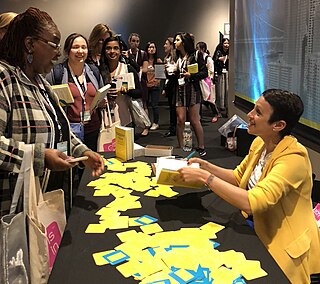Related Research Articles
Ergophobia is described as an extreme and debilitating fear associated with work, a fear of finding or losing employment, or fear of specific tasks in the workplace. The term ergophobia comes from the Greek "ergon" (work) and "phobos" (fear).
Emotional labor is the process of managing feelings and expressions to fulfill the emotional requirements of a job. More specifically, workers are expected to regulate their personas during interactions with customers, co-workers, clients, and managers. This includes analysis and decision-making in terms of the expression of emotion, whether actually felt or not, as well as its opposite: the suppression of emotions that are felt but not expressed. This is done so as to produce a certain feeling in the customer or client that will allow the company or organization to succeed.
Unwritten rules are behavioral constraints imposed in organizations or societies that are not typically voiced or written down. They usually exist in unspoken and unwritten format because they form a part of the logical argument or course of action implied by tacit assumptions. Examples involving unspoken rules include unwritten and unofficial organizational hierarchies, organizational culture, and acceptable behavioral norms governing interactions between organizational members. These rules typically align with the behaviors of the local majority group and seem normal to them, but can be obscure, invisible, and exclusionary to minority groups.
Emotion work is understood as the art of trying to change in degree or quality an emotion or feeling.
Feeling rules are socially shared norms that influence how people want to try to feel emotions in given social relations. This concept was introduced by sociologist Arlie Russell Hochschild in 1979. Hochschild's 1983 book, The Managed Heart: Commercialization of Human Feeling, discusses feeling rules in greater depth, especially in the occupational worlds of flight attendants and bill collectors. Hochschild draws on the work of sociologist Erving Goffman as well as labor scholar Harry Braverman to discuss the dramaturgical demands and emotional labor entailed by jobs in the service sector, in which workers must "perform" certain roles that entail abiding by certain feeling rules. She notes that women are more likely to have such jobs than men, and that analysis of feeling rules may therefore be especially relevant to understanding the gendered dimensions of labor. This work foreshadows themes from her later analyses of women's work, both paid and unpaid, e.g. in The Commercialization of Intimate Life (2003).

Emotional exhaustion is symptom of burnout, a chronic state of physical and emotional depletion that results from excessive work or personal demands, or continuous stress. It describes a feeling of being emotionally overextended and exhausted by one's work. It is manifested by both physical fatigue and a sense of feeling psychologically and emotionally "drained".
Sarah J. Tracy is an organizational communication scholar and full professor in Arizona State University’s Hugh Downs School of Human Communication.

The sociology of emotions applies sociological theorems and techniques to the study of human emotions. As sociology emerged primarily as a reaction to the negative effects of modernity, many normative theories deal in some sense with emotion without forming a part of any specific subdiscipline: Karl Marx described capitalism as detrimental to personal 'species-being', Georg Simmel wrote of the deindividualizing tendencies of 'the metropolis', and Max Weber's work dealt with the rationalizing effect of modernity in general.

Envy is an emotion which occurs when a person lacks another's quality, skill, achievement, or possession and wishes that the other lacked it. Envy can also refer to the wish for another person to lack something one already possesses so as to remove the equality of possession between both parties.

The ICD-11 of the World Health Organization (WHO) describes occupational burnout as an occupational phenomenon resulting from chronic workplace stress that has not been successfully managed, with symptoms characterized by "feelings of energy depletion or exhaustion; increased mental distance from one’s job, or feelings of negativism or cynicism related to one's job; and reduced professional efficacy." It is classified as a mismatch between the challenges of work and a person's mental and physical resources, but is not recognized by the WHO as a medical condition.
Emotions in the workplace play a large role in how an entire organization communicates within itself and to the outside world. "Events at work have real emotional impact on participants. The consequences of emotional states in the workplace, both behaviors and attitudes, have substantial significance for individuals, groups, and society". "Positive emotions in the workplace help employees obtain favorable outcomes including achievement, job enrichment and higher quality social context". "Negative emotions, such as fear, anger, stress, hostility, sadness, and guilt, however increase the predictability of workplace deviance,", and how the outside world views the organization.
Bounded emotionality is a communications studies approach to dealing with emotional control in the workplace. Emotional control simply refers to how employers and employees handle the range of emotions that naturally occur in the workplace. These emotions can occur because of work, or they can be brought into work from an employee's home life. Bounded emotionality was proposed by Dennis K. Mumby and Linda Putnam.
The nursing organization workplace has been identified as one in which workplace bullying occurs quite frequently. It is thought that relational aggression are relevant. Relational aggression has been studied amongst girls but rarely amongst adult women. According to a finding, 74% of the nurses, 100% of the anesthetists, and 80% of surgical technologists have experienced or witnessed uncivil behaviors like bullying by nursing faculty. There have been many incidents that have occurred throughout the past couple of years. OSHA, which stands for "Occupational Safety and Health Administration" stated that from 2011 to 2013, the United States healthcare workers experienced 15,000 to 20,000 significant injuries while in the workplace.
Positive psychology is defined as a method of building on what is good and what is already working instead of attempting to stimulate improvement by focusing on the weak links in an individual, a group, or in this case, a company. Implementing positive psychology in the workplace means creating an environment that is more enjoyable, productive, and values individual employees. This also means creating a work schedule that does not lead to emotional and physical distress.
A “toxic workplace” is a colloquial metaphor used to describe a place of work, usually an office environment, that is marked by significant personal conflicts between those who work there. A toxic work environment has a negative impact on an organization's productivity and viability. This type of environment can be detrimental to both the effectiveness of the workplace and the well-being of its employees.
Self-estrangement is the idea conceived by Karl Marx in Marx's theory of alienation and Melvin Seeman in his five logically distinct psychological states that encompasses alienation. As spoken by Marx, self-estrangement is "the alienation of man's essence, man's loss of objectivity and his loss of realness as self-discovery, manifestation of his nature, objectification and realization". Self-estrangement is when a person feels alienated from others and society as a whole. A person may feel alienated by his work by not feeling like he has meaning to his work, therefore losing their sense of self at the work place. Self-estrangement contributes to burnout at work and a lot of psychological stress.

Liz and the Blue Bird is a 2018 Japanese animated drama film directed by Naoko Yamada and written by Reiko Yoshida, based on the Sound! Euphonium novel series written by Ayano Takeda and its eponymous anime television series adaptation by Yamada and Tatsuya Ishihara. Inspired in particular by the 2017 Sound! Euphonium novel Hibike! Yūfoniamu Kitauji Kōkō Suisōgaku-bu, Haran no Dainigakushō Kōhen, the film is a spin-off sequel to the television series, focusing on the friendship of Mizore Yoroizuka and Nozomi Kasaki, two supporting characters introduced during the series' second novel. It is intended as a standalone work that can be fully understood without prior knowledge of the series.

Toxic positivity, also known as excessive positivity or positive toxicity, is dysfunctional emotional management without the full acknowledgment of negative emotions, particularly anger and sadness. Socially, it is the act of dismissing another person's negative emotions by suggesting a positive emotion instead.

Bittersweet: How Sorrow and Longing Make Us Whole is a 2022 nonfiction book written by American author Susan Cain.

Nataly Kogan is a Russian-born American author, entrepreneur, keynote speaker, expert on emotional fitness, and artist. She has written three books: Happier Now, Gratitude Daily, and The Awesome Human Project; hosts The Awesome Human Podcast; and is a frequent keynote speaker. In her 2013 presentation for TEDxBoston on How Pancakes Can Make You Happier and Change the World, she talks about the power of gratitude for the small, good moments we experience on a daily basis rather than any huge achievements.
References
- ↑ "Comparing yourself to others is a sure route to misery — 5 ways to turn it into action instead". ideas.ted.com. 2022-06-09. Retrieved 2024-08-23.
- ↑ Kim, Eugene. "15 cartoons that explain how Silicon Valley sees the world today" . Business Insider. Retrieved 2024-08-23.
- ↑ Payton, L'Oreal Thompson. "Preventing burnout is now the number one job for bosses. These 7 strategies can protect your teams". Fortune Well. Retrieved 2024-08-23.
- ↑ "45 Work And Life Struggles Illustrated In Comic-Charts By Liz And Mollie". Bored Panda. 2021-03-05. Retrieved 2024-08-23.
- ↑ Homayun, Omaid. "Navigating Feelings At Home And Work". Forbes. Retrieved 2024-08-23.
- 1 2 3 4 5 6 7 8 Fosslien, Liz; West Duffy, Mollie. "These Two Millennial Authors Want You To Acknowledge Your Feelings At Work". Forbes (Interview). Interviewed by Rimma Boshernitsan. Retrieved 2024-08-13.
- 1 2 3 4 Fosslien, Liz; West Duffy, Mollie (April 26, 2022). "The power in owning your 'Big Feelings". NPR (Interview). Interviewed by Juana Summers.
- 1 2 3 4 5 Fosslien, Liz. "15 questions with Liz Fosslien". CNNMoney (Interview). Retrieved 2024-08-13.
- ↑ West Duffy, Mollie (2019-06-12). "Seattle native helps people be happier at work | Produced by Seattle Times Marketing". The Seattle Times (Interview). Interviewed by Michelle Archer. Retrieved 2024-08-23.
- ↑ "5 books to help you finally achieve work life balance". Fast Company.
- ↑ "Selective vulnerability: How to share your feelings at work". www.hcamag.com. Retrieved 2024-08-23.
- ↑ "7 Tips on How Introverts and Extroverts Can Both Flourish At Work - Brit + Co". www.brit.co. 2019-04-20. Retrieved 2024-08-23.
- ↑ Heaney, Katie (2019-04-01). "Does Your Office Suffer From Conference Room Aggression?". The Cut. Retrieved 2024-08-23.
- ↑ "How to recognize if you're overreacting". Fast Company.
- 1 2 3 4 Fosslien, Liz; West Duffy, Mollie (2023-11-13). "So Many Feelings. Too Many?". Harvard Business Review (Interview). Interviewed by Amy Gallo, Amy Bernstein. Retrieved 2024-08-13.
- ↑ "Big Feelings Day with Liz and Mollie | All Of It". WNYC. Retrieved 2024-08-23.
- ↑ Rebolini, Arianna (2019-01-31). "These Comics About Work Anxieties Are Painfully Real". BuzzFeed News. Retrieved 2024-08-23.
- ↑ Kim, Eugene. "17 cartoons that perfectly describe life in Silicon Valley". Business Insider. Retrieved 2024-08-23.
- 1 2 3 Gutterman, Annabel (2019-01-03). "Why You Shouldn't Hide Your Emotions at Work". TIME. Retrieved 2024-08-13.
- ↑ Fosslien, Liz; Duffy, Mollie West (2019-02-05). No Hard Feelings: The Secret Power of Embracing Emotions at Work. Penguin. ISBN 978-0-525-53384-9.
- ↑ Fosslien, Liz; West Duffy, Mollie (June 6, 2022). "In 'Big Feelings:' Advice on how to be okay... when things are not okay". NPR (Interview). Interviewed by Juana Summers.
- ↑ Fosslien, Liz; Duffy, Mollie West (2022-07-07). Big Feelings: How to Be Okay When Things Are Not Okay. Canongate Books. ISBN 978-1-83885-852-0.